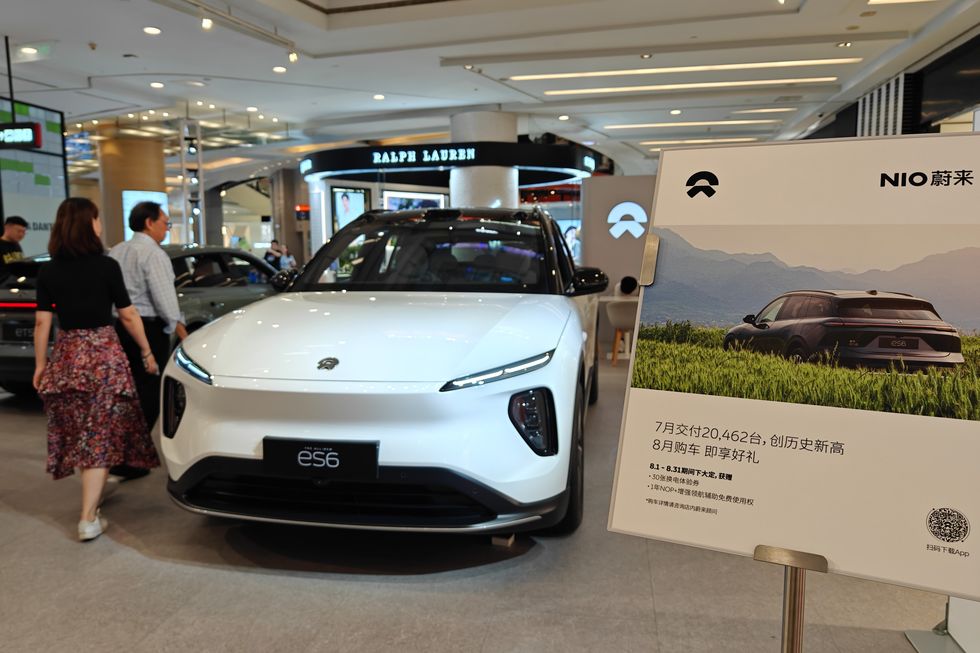- European Commission President Ursula von der Leyen criticized Chinese automakers in her State of the Union speech, announcing an anti-subsidy probe into imports of Chinese vehicles to EU countries.
- Calls for tariffs on Chinese EVs in the EU had been growing for months, as more Chinese brands have begun sales on the continent amid a sharp turn to EVs in western and northern Europe.
- In response to the planned probe, China’s Ministry of Commerce has called the probe a protectionist act.
The European Union will launch an anti-subsidy investigation into Chinese EVs on sale in the EU, probing alleged unfair competition from Chinese automakers following the debuts of several new electric models in Europe.
Over the past few years a number of Chinese automakers have launched sales in the EU, including BYD, Xpeng, and Nio—and more are on the way.
While Chinese-owned automakers like MG and Volvo have been present in the EU for years since their acquisitions, the EV era kicked the process into high gear as European automakers had been slow to roll out their own electric models when demand surged in 2020.
European Commission President Ursula von der Leyen outlined the issue in a State of the Union address this week.
“It is a crucial industry for the clean economy, with a huge potential for Europe,” von der Leyen said of the EV sector.
“But global markets are now flooded with cheaper Chinese electric cars.”
“And their price is kept artificially low by huge state subsidies.”
“This is distorting our market.”
“And as we do not accept this from the inside, we do not accept this from the outside.”
The issue is not anything new per se in the discourse of EU politics, with a number of countries including France having brought up lower-priced Chinese electric vehicles appearing on sale over the past several years, just as several European manufacturers have faced significant headwinds early on in the pandemic.
These have included issues with raw materials, labor, and the supply of electronic chips for cars, with 2022 having also delivered an entirely new energy landscape in the wake of Russian military action in Ukraine, which has spiked energy prices and has largely ended the imports of various metals into the EU.
Several European automakers have also experienced periods of production halts due to disruptions in the work of component suppliers in Ukraine—all phenomena from which China has been largely insulated.
“We have not forgotten how China’s unfair trade practices affected our solar industry,” von der Leyen said earlier in her address.
“Many young businesses were pushed out by heavily subsidized Chinese competitors.”
“Pioneering companies had to file for bankruptcy.”
With the implicit threat of tariffs against Chinese-made EVs, the situation is complicated by the fact that many European automakers themselves have production facilities in China, operated as joint ventures with Chinese automakers, that could face retaliatory economic measures.
European automakers in China have already seen a pushback of sorts in the past few years due to competition from domestic brands in the same market—an entirely new situation that would have been unthinkable just 15 years prior. The VW Group in particular, present in China since 1984, has seen its longtime dominance of the passenger car sphere fade as new Chinese brands have started to win over consumers in what is now the world’s largest automotive market.
In the day since the announcement of an EU investigation, China’s Ministry of Commerce labeled the probe as a “naked protectionist act,” promising to safeguard the interests and rights of Chinese manufacturers.
While a number of vehicles that are produced in China are sold in the US, including ones from the Buick and Polestar brands, Chinese automakers have yet to launch sales under their own brands stateside after over a decade of announcing plans to do so.
Are sales of EVs from Chinese brands in the US inevitable, or will market factors or other issues eventually prevent their entry stateside? Let us know what you think.

Jay Ramey grew up around very strange European cars, and instead of seeking out something reliable and comfortable for his own personal use he has been drawn to the more adventurous side of the dependability spectrum. Despite being followed around by French cars for the past decade, he has somehow been able to avoid Citroën ownership, judging them too commonplace, and is currently looking at cars from the former Czechoslovakia. Jay has been with Autoweek since 2013.
Read the full article here



